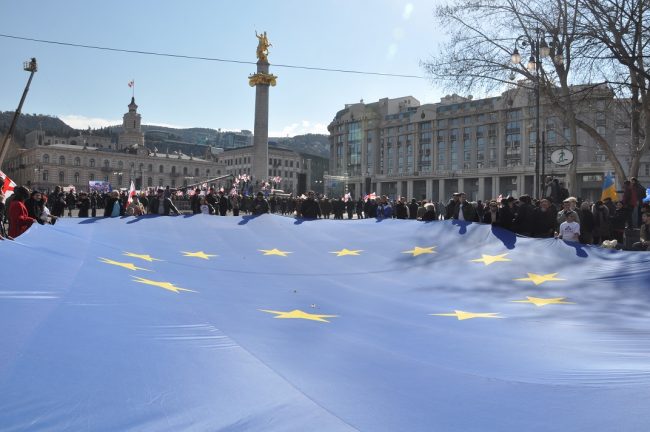



Sixteen percent of Georgia’s population believe the country is an EU member, according to a new survey from CRRC-Georgia, with ethnic Georgians and women the most likely to believe this.
Recent years have seen Georgia’s ties to the European Union grow, with the Association Agreement, including the preferential trade regime it introduced known as the Deep and Comprehensive Free Trade Area signed in 2014 and the granting of visa liberalisation for citizens of Georgia in 2017.
Both represent significant steps towards integration with the EU for Georgia. As part of reaching these milestones, Georgian legislation is being harmonised with the EU’s in a number of fields. The country, however, is currently neither a member of the EU nor even a candidate for membership.
Recent steps towards closer EU integration may have lead some in Georgia to mistakenly believe the country is an EU member. Sixteen percent of the population of Georgia reported in May 2017 that the country was a member of the European Union, and a further 10% answered ‘don’t know’, according to the fifth wave of the Knowledge of and Attitudes towards the European Union survey (EU survey), which CRRC-Georgia carried out for the Europe Foundation.
By comparison, in 2015 only 5% of the population thought Georgia was a member and 12% reported not knowing. While the data show no notable changes over time for people of different age groups (2015, 2017), the answers provided by men and women, as well as those provided by ethnic Georgians, did change between 2015 and 2017.
The increase in thinking the country is a member of the EU is mainly among the ethnic Georgian population. While in 2015 the ethnic minority population reported that Georgia was a member of the EU slightly more often than the rest of the population, in 2017 ethnic Georgians reported that Georgia was an EU member at the same rate as the ethnic minority population. The share of the ethnic minority population who reported that they didn’t know whether Georgia was or was not a member of the European Union increased by 11 percentage points between 2015 and 2017.
Ethnicity aside, it also appears that women were more likely to be mistaken about Georgia’s EU membership than men in 2017. While only 6% of women thought that Georgia was a member of the EU in 2015, 22% did in 2017. By comparison, 5% of men thought that Georgia was an EU member state in 2015 and 10% reported so in 2017. This increase has no clear explanation and requires further research.
This misperception suggests that clearer communications are needed about Georgia’s relationship with the EU, and Georgia’s status in the EU integration process.
Dustin Gilbreath is a Policy Analyst at CRRC-Georgia. The views presented in this article are the author’s alone and do not represent the views of CRRC-Georgia or any related entity.
The data used in this article is available from CRRC-Georgia’s Online Data Analysis Tool.








